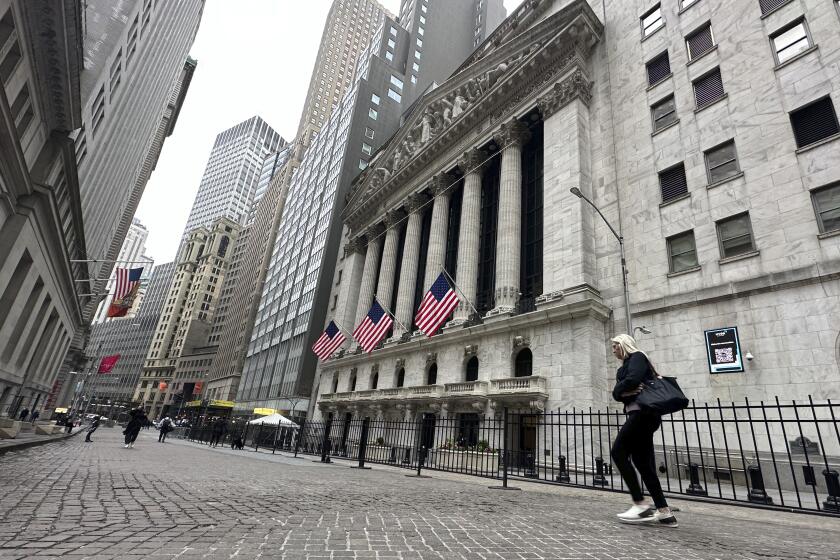Fund Probe Focusing on Big-Money Practice
In a mutual fund scandal with so much wrongdoing that it’s losing shock value, state and federal regulators are zeroing in on a practice that could prove to be the most harmful to investors.
The regulators are scrutinizing whether mutual funds willingly pay excessive stock trading commissions to brokerage firms that in turn aggressively push those funds to individual investors -- and whether the payments are properly disclosed.
The probes go to the heart of how the fund and brokerage industries operate and center on basic issues of customer fairness, such as whether brokers recommend funds to their clients based on hidden financial incentives rather than the investors’ best interests.
The cost to investors of paying excessive commissions in the course of a practice known as directed brokerage could vastly exceed the tally from the late trading and market-timing abuses that have been at the eye of investigations into the fund industry and any reforms could be among the most far-reaching to emerge from the debacle.
“It’s where the big money is,” said Roy Weitz, editor of Tarzana-based FundAlarm.com, referring to directed brokerage and other so-called soft-dollar deals between fund companies and Wall Street firms. “It’s larger than market timing and late trading combined.”
The Securities and Exchange Commission and the National Assn. of Securities Dealers began investigating directed brokerage arrangements last year as part of their wider probes into the fund industry. California Atty. Gen. Bill Lockyer said Friday that his office was looking into sales practices at three large California fund companies.
Directed brokerage is legal, but brokerages and fund companies must abide by certain SEC and NASD rules.
The deals are crucial for fund companies, which need to stand out from a sea of competitors and are desperate for brokers to recommend their funds over others. For example, in exchange for getting trading business from a fund firm, a brokerage may name the company’s funds to a “preferred” list that is pitched to the brokerage’s clients.
“You’ve got to be able to compete,” said Lars Schuster, analyst at Financial Research Corp. “For a majority of the fund industry, you’ve got to pay to play.” That has become more important as investors increasingly turn to brokers to pick funds.
Only 13% of fund purchases last year were made by investors directly contacting fund companies. Most funds are sold through third parties such as brokers, independent advisors and 401(k) retirement plans.
Like small investors, mutual funds use brokerage firms to buy and sell stocks and other securities on their behalf. Federal rules require funds to get the “best execution” on their trades -- broadly defined as paying the lowest possible price when buying stock and receiving the highest price when selling it.
Fund companies say that as long as they get the best execution, there’s nothing wrong with picking a brokerage that promotes their funds. Indeed, directed brokerage has occurred throughout the industry for years and has been defended by fund companies.
But in a sign of the overall pressure on fund firms, the industry’s main trade group now says the practice should be banned because it creates a “significant potential conflict of interest.” Theoretically, eliminating the practice would encourage brokers to recommend funds based on performance rather than on financial incentives.
It’s unclear whether individual fund companies will go along, though a handful already have pledged to stop.
The issue of directed brokerage burst into the open in November when Wall Street brokerage giant Morgan Stanley agreed to pay $50 million to settle SEC allegations related to payments from 14 fund companies for promoting their funds.
Regulators accused the firm of violating SEC disclosure requirements and breaking an NASD rule barring brokerages from basing fund sales on commissions they receive.
Critics say directed brokerage hurts investors in several ways. Funds that direct their trading to specified brokerages have little motivation to keep trading commissions low -- such as by using inexpensive electronic trading -- and may have incentives to overpay.
Those costs are passed on to investors and can reduce a fund’s returns. But shareholders can’t avoid the trading costs or even figure out how much they’re paying. That’s because trading fees are excluded from a fund’s so-called expense ratio, the industry’s official fee measurement.
According to a 2003 poll of 34 fund companies by consulting firm Greenwich Associates, the firms paid $2.6 billion in commissions in 2002 to buy U.S. stocks. About 6%, or more than $150 million, of the commissions were directed brokerage payments. The funds’ average commission was 4.2 cents, double the amount for electronic trades.
Some people within the fund industry say directed brokerage hurts investors.
John Wheeler, head of stock trading at the American Century fund group, says funds should shop their trading business to a variety of brokerages.
“We should be doing everything we can to lower commission costs for investors,” Wheeler said, “and to take the approach, “Oh, I’m going to incur this expense anyway’ is totally irresponsible. That’s the kind of behavior that gives this industry a bad name.”
What’s most troubling to some critics is that fund companies may, in effect, be using investors’ own money against them. The ultimate goal of directed brokerage is to increase the amount of money invested in a mutual fund. That can be bad for existing shareholders, because investment performance often declines as a fund grows in size, especially if it focuses on smaller stocks.
Moreover, hidden financial incentives could lead brokers to recommend funds that perform subpar, experts said.
The SEC is examining whether 15 other large brokerages have practices similar to Morgan Stanley’s. It also is looking at 14 fund companies, including Pimco Funds of Newport Beach and Capital Research & Management Co. of Los Angeles, which runs the American Funds group.
Lockyer’s office is probing Pimco, Capital Group and Franklin Templeton Investments of San Mateo, Calif., according to sources familiar with the matter.
The SEC seems to be most concerned with whether funds are properly disclosing the payments to investors and accounting for them properly as marketing costs.
The NASD is investigating more than 40 brokerages and other firms. The regulator is probing compensation arrangements between brokerage firms and mutual funds, and between brokerages and their employees, said NASD Vice Chairwoman Mary Schapiro.
In the aftermath of the Morgan Stanley case, several fund companies, including Putnam Investments, MFS Investment Management and Franklin Templeton, have said they would voluntarily discontinue the practice.
The board of Putnam, the fifth-largest fund company and one of the most tainted by the overall fund scandal, offered the sharpest rebuke of directed brokerage.
John Hill, chairman of the Putnam’s board of trustees, said the Boston firm would stop rewarding brokers for fund sales at the start of this year.
“We’re going to say, ‘No brokerage for sales,’ ” Hill said. “It creates a potential conflict of interest I’d just as soon not have to worry about.”
Directed brokerage is far costlier to shareholders than market timing and late trading, Hill said.
“Let’s be serious: The six portfolio managers who were market timing Putnam funds got a total of $600,000 to $700,000,” Hill said. “Directed brokerage costs $30 million to $40 million a year at Putnam. And it’s year in and year out.”
Fund company prospectuses typically disclose in general terms that they engage in directed brokerage. But the disclosures are often murky and all but impossible for typical investors to understand.
For example, the prospectus for the giant American Funds’ Growth Fund of America says the fund may pay annual 12b-1 fees of 0.25% to 1% of assets to cover distribution and “shareholder service” expenses. The fund’s distributor, the prospectus says, “may pay, or sponsor informational meetings for, dealers as described in the statement of additional information.”
That statement, which shareholders can get by request, explains that additional compensation is paid to the top 100 dealers who have sold shares of the fund or other products from American Funds.
Company spokesman Chuck Freadhoff said the firm was following rules established by the SEC and the NASD.
“We have never committed to do a specific amount of business with Morgan Stanley or anyone else,” Freadhoff said. “Will we take [fund] sales into consideration? If we can get best execution from more than one source, yes, but we never use second-best execution because a broker-dealer sells our funds.”
He defined best execution as “a combination of price, discretion and speed.”
“If we are in a hurry to sell 500,000 shares of a stock and one broker-dealer can take the order now but charge a higher price,” Freadhoff said, “that might be better for the fund than a broker that is cheaper but would take four weeks to do it.”
Such explanations ring hollow with fund industry critics.
“It’s a kickback, pure and simple,” said Wayne Wagner, chief executive of Plexus Group, a trading-cost consulting firm in West Los Angeles. “The manager is paying somebody to recommend [his fund]. That doesn’t leave anybody with clean hands.”






